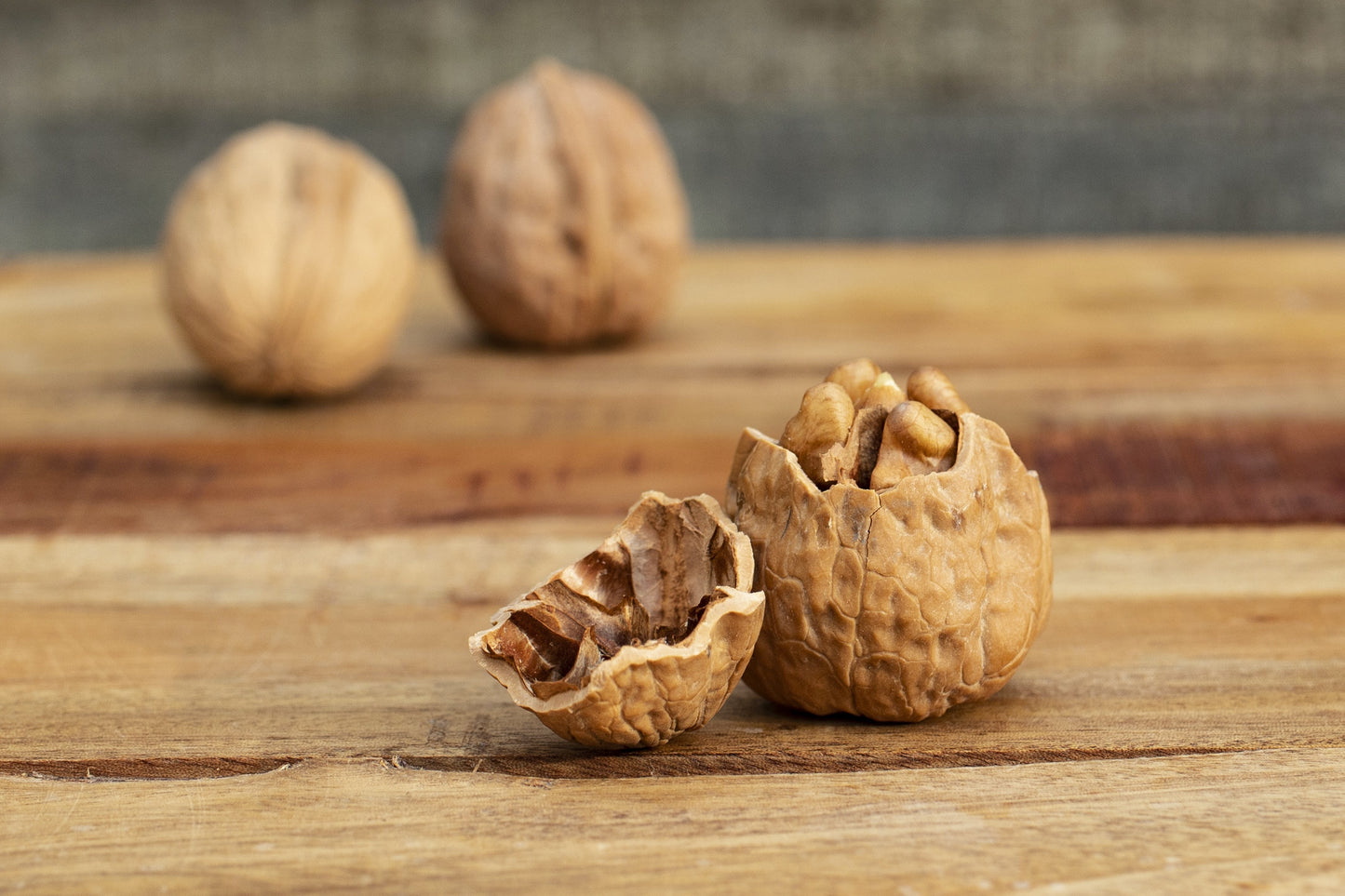
The best source of Omega-3 fatty acids for vegans is algae-based supplements.
This article will explore why algae reigns superior over other plant-based options and how you can incorporate it into a vegan diet for optimal health benefits.
The Best Vegan Sources of Omega 3
While animal-based sources reign supreme in providing EPA and DHA, algae is the best source for vegans seeking optimal omega-3 intake.
EPA and DHA are essential fatty acids that play crucial roles in various bodily functions. While the body can convert ALA (alpha-linolenic acid), a plant-based omega-3, into EPA and DHA, this conversion is inefficient, yielding minimal amounts that often fall short of meeting our needs.
Algae, on the other hand, is a rich source of EPA and DHA, providing a direct and readily absorbable form of these vital nutrients. This makes algae the ideal choice for vegans and vegetarians seeking to ensure they obtain adequate amounts of these essential fatty acids.
10 Best Plant Sources of Omega
1. Algae
Algae is a diverse group of aquatic organisms that have been recognized for their nutritional value for centuries. Among the many nutrients algae contain, omega-3 fatty acids are particularly noteworthy. Algae is a rich source of both eicosapentaenoic acid (EPA) and docosahexaenoic acid (DHA), the two most important omega-3 fatty acids for human health.
In contrast to plant-based sources of omega-3s, which primarily contain alpha-linolenic acid (ALA), algae provides EPA and DHA directly. The body can convert ALA into EPA and DHA, but this conversion is inefficient, with only a small percentage being converted. As a result, consuming algae is a more effective way to obtain EPA and DHA.
The omega-3 fatty acids found in algae are readily absorbed by the body. Studies have shown that the bioavailability of EPA and DHA from algae is comparable to that from fish oil. This makes algae an excellent option for individuals who are looking for a plant-based source of omega-3s that is readily absorbed.
In addition to being a potent source of omega-3 fatty acids, algae also offers a number of other health benefits. Algae is a good source of protein, vitamins, minerals, and antioxidants. These nutrients can contribute to overall well-being and help to reduce the risk of chronic diseases.
2. Chia seeds
Chia seeds are tiny, black seeds that are derived from the Salvia hispanica plant, a member of the mint family. Native to Central and South America, chia seeds have been consumed for centuries for their nutritional value.
In addition to being a good source of fiber, protein, and minerals, chia seeds are particularly noteworthy for their omega-3 fatty acid content. Just one ounce (28 grams) of chia seeds contains approximately 5 grams of alpha-linolenic acid (ALA), a type of omega-3 fatty acid that the body can convert into eicosapentaenoic acid (EPA) and docosahexaenoic acid (DHA).
While the body's conversion of ALA into EPA and DHA is not particularly efficient, chia seeds can still be a valuable source of these important omega-3s. In fact, studies have shown that consuming chia seeds can lead to significant increases in blood levels of EPA and DHA.
In addition to their omega-3 fatty acid content, chia seeds also offer a number of other health benefits. Chia seeds are a good source of soluble fiber, which can help to lower cholesterol levels. They are also a good source of antioxidants, which can help to protect cells from damage.
3. Hemp seeds
Hemp seeds are derived from the Cannabis sativa plant, a member of the Cannabaceae family. While hemp is often associated with marijuana, hemp seeds contain no psychoactive compounds. In fact, hemp seeds have been consumed for centuries for their nutritional value.
Hemp seeds are a good source of protein, fiber, and minerals. They are also a particularly rich source of omega-3 fatty acids. Just one ounce (28 grams) of hemp seeds contains approximately 3 grams of alpha-linolenic acid (ALA), a type of omega-3 fatty acid that the body can convert into eicosapentaenoic acid (EPA) and docosahexaenoic acid (DHA).
In addition to their omega-3 fatty acid content, hemp seeds also offer a number of other health benefits. Hemp seeds are a good source of gamma-linolenic acid (GLA), a type of fatty acid that has been shown to have anti-inflammatory properties. They are also a good source of antioxidants, which can help to protect cells from damage.
Hemp seeds are a sustainable food source. Hemp plants are fast-growing and require little water. They also do not require the use of herbicides or pesticides. As a result, hemp is a more environmentally friendly crop than many other sources of protein and omega-3 fatty acids.
4. Flaxseeds
Flaxseeds are tiny, unassuming seeds that pack a powerful punch when it comes to omega-3 fatty acids. Just one tablespoon of flaxseeds contains a whopping 1.8 grams of alpha-linolenic acid (ALA), a type of omega-3 fatty acid that the body can convert into eicosapentaenoic acid (EPA) and docosahexaenoic acid (DHA).
EPA and DHA are essential for brain health, heart health, and eye health. They play a role in reducing inflammation, improving blood flow, and protecting cells from damage.
While the body's conversion of ALA into EPA and DHA is not particularly efficient, consuming flaxseeds can still be a valuable way to obtain these important omega-3s. In fact, studies have shown that consuming flaxseeds can lead to significant increases in blood levels of EPA and DHA.
5. Walnuts
Walnuts are a delicious and nutritious nut that is a good source of omega-3 fatty acids. Just one ounce of walnuts contains 2.5 grams of alpha-linolenic acid (ALA), a type of omega-3 fatty acid that the body can convert into eicosapentaenoic acid (EPA) and docosahexaenoic acid (DHA).
EPA and DHA are essential for brain health, heart health, and eye health. They play a role in reducing inflammation, improving blood flow, and protecting cells from damage.
While the body's conversion of ALA into EPA and DHA is not particularly efficient, consuming walnuts can still be a valuable way to obtain these important omega-3s. In fact, studies have shown that consuming walnuts can lead to significant increases in blood levels of EPA and DHA.
6. Edamame
Edamame are immature soybeans that are a good source of alpha-linolenic acid (ALA), a type of omega-3 fatty acid that the body can convert into eicosapentaenoic acid (EPA) and docosahexaenoic acid (DHA). While the body's conversion of ALA into EPA and DHA is not particularly efficient, consuming edamame can still be a valuable way to obtain these important omega-3s.
Just one cup of edamame contains approximately 0.28 grams of ALA. In addition to their omega-3 fatty acid content, edamame are also a good source of:
- Protein
- Fiber
- Iron
- Vitamin C
- Vitamin K
- Folate
- Manganese
7. Kidney beans
Kidney beans are a type of common bean that is known for its distinctive kidney shape and deep red color. They are a good source of alpha-linolenic acid (ALA), a type of omega-3 fatty acid that the body can convert into eicosapentaenoic acid (EPA) and docosahexaenoic acid (DHA).
While the body's conversion of ALA into EPA and DHA is not particularly efficient, consuming kidney beans can still be a valuable way to obtain these important omega-3s. Just one cup of cooked kidney beans contains approximately 0.12 grams of ALA.
8. Brussels sprouts
Brussels sprouts are a cruciferous vegetable that is known for its unique flavor and nutritional value. They are a good source of alpha-linolenic acid (ALA), a type of omega-3 fatty acid that the body can convert into eicosapentaenoic acid (EPA) and docosahexaenoic acid (DHA).
While the body's conversion of ALA into EPA and DHA is not particularly efficient, consuming Brussels sprouts can still be a valuable way to obtain these important omega-3s. Just one cup of cooked Brussels sprouts contains approximately 0.13 grams of ALA.
9. Collard greens
Collard greens are a type of leafy green vegetable that is known for its hearty flavor and nutritional value. They are a good source of alpha-linolenic acid (ALA), a type of omega-3 fatty acid that the body can convert into eicosapentaenoic acid (EPA) and docosahexaenoic acid (DHA).
While the body's conversion of ALA into EPA and DHA is not particularly efficient, consuming collard greens can still be a valuable way to obtain these important omega-3s. Just one cup of cooked collard greens contains approximately 0.10 grams of ALA.
10. Spinach
Spinach is a leafy green vegetable that is known for its high nutrient content. It is a good source of alpha-linolenic acid (ALA), a type of omega-3 fatty acid that the body can convert into eicosapentaenoic acid (EPA) and docosahexaenoic acid (DHA).
While the body's conversion of ALA into EPA and DHA is not particularly efficient, consuming spinach can still be a valuable way to obtain these important omega-3s. Just one cup of cooked spinach contains approximately 0.10 grams of ALA.
Vegan Omega FAQS
How much omega-3 do I need per day as a vegan?
The recommended daily intake of omega-3 fatty acids for adults is 1.1 grams for women and 1.6 grams for men. However, vegans may need to consume more omega-3s than non-vegans, as the body is not as efficient at converting ALA into EPA and DHA. A good rule of thumb for vegans is to aim for 2-3 grams of ALA per day.
What are the benefits of omega-3 fatty acids for vegans?
Omega-3 fatty acids are essential for brain health, heart health, eye health, and inflammation reduction. They may also help to reduce the risk of cancer, Alzheimer's disease, and depression. These benefits are just as important for vegans as they are for non-vegans.
Is it difficult to get enough omega-3s on a vegan diet?
It can be more challenging to get enough omega-3s on a vegan diet, as the best sources of these fatty acids are typically animal-based. However, by including a variety of the vegan sources listed above in your diet, you can ensure that you are getting enough of these important nutrients.
Should I take an omega-3 supplement as a vegan?
If you are concerned that you are not getting enough omega-3s from your diet, you may want to consider taking an omega-3 supplement. However, it is important to talk to your doctor before starting any new supplement, as they can help you determine if a supplement is right for you.
How can I increase my absorption of omega-3s as a vegan?
There are a few things you can do to increase your absorption of omega-3s as a vegan:
- Consume omega-3s with a source of fat. Fat helps to increase the absorption of omega-3s. Good sources of fat for vegans include avocados, nuts, seeds, and olive oil.
- Grind flaxseeds before consuming them. Grinding flaxseeds helps to break down the cell walls, making the ALA more readily available for absorption.
- Cook chia seeds before consuming them. Cooking chia seeds helps to soften the outer shell, making the ALA more readily available for absorption.
- Avoid consuming too much omega-6 fatty acids. Omega-6 fatty acids can compete with omega-3 fatty acids for absorption. Good sources of omega-6 fatty acids for vegans include vegetable oils, such as corn oil, sunflower oil, and safflower oil.
References:
-
Hill, A. M., & Harris, W. S. (2006). n-3 Long-chain polyunsaturated fatty acids in fish: human health benefits and concerns. Nutrition Reviews, 64(s1), S27-S34.
-
Boucher, O., Burden, M. J., Muckle, G., Saint-Amour, D., Ayotte, P., & Dewailly, E. (2010). Neurophysiologic and neurobehavioral evidence of the beneficial effects of prenatal omega-3 fatty acid intake on school-age memory function. American Journal of Clinical Nutrition, 92(5), 1060-1073.
-
Griel, A. E., Kris-Etherton, P. M., & Etherton, T. D. (2006). Omega-3 fatty acids in vegan diets. American Journal of Clinical Nutrition, 83(6), S1567-S1570.
-
Mangels, R., Messina, V., & Messina, M. (2014). The Dietitian's Guide to Vegetarian Diets: Issues and Applications (3rd ed.). Jones & Bartlett Learning.
